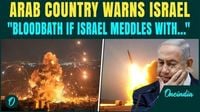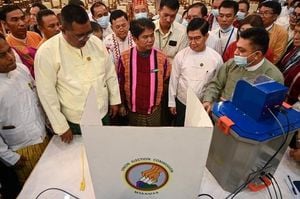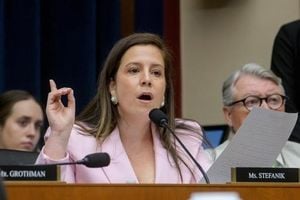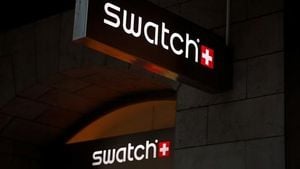On August 17, 2025, Syria’s interim President Ahmed al-Sharaa issued a warning to Israel that has reverberated across the Middle East, accusing the state of fueling unrest in the southern province of Suweida and threatening that further Israeli intervention could ignite a new regional war. The statement, broadcast by Syrian state television and echoed by several international outlets including Reuters and OneIndia, came as the country grapples with deepening sectarian violence and mounting calls for regional autonomy.
Al-Sharaa’s remarks arrived amid a volatile backdrop: hundreds of demonstrators gathered in Sweida, a Druze-majority region in southern Syria, to demand self-determination and decry the recent surge in violence. The protests followed a week of bloodshed that began on July 13, 2025, with fierce clashes between Druze fighters and Bedouin groups. According to reports from witnesses and the Syrian Observatory for Human Rights, Syrian security forces—who claimed to be intervening to stop the fighting—were accused of siding with Bedouin factions and committing abuses against Druze civilians, including summary executions. The government, for its part, has denied any partiality but acknowledged that “Sweida witnessed many violations from all sides… some members of the security forces and army in Syria,” as Al-Sharaa himself admitted during a dialogue session with officials and notables from Idlib province.
“We still have another battle ahead of us to unify Syria, and it should not be with blood and military force… it should be through some kind of understanding because Syria is tired of war,” Al-Sharaa said, as quoted by AFP and state media. His words struck a chord with many Syrians exhausted by more than a decade of conflict, displacement, and foreign intervention. “I do not see Syria as at risk of division. Some people desire a process of dividing Syria and trying to establish cantons… this matter is impossible,” he continued, firmly rejecting any notion of partition.
The president’s comments also targeted what he described as foreign meddling, particularly by Israel. “Some parties seek to gain power through regional power, Israel or others. This is also extremely difficult and cannot be implemented,” Al-Sharaa asserted. He went further, directly accusing Israel of “intervening directly in Sweida, seeking to implement policies aimed at weakening the state in general or finding excuses to interfere in ongoing policies in the southern region.” These accusations were underscored by his condemnation of recent Israeli airstrikes in Damascus and southern Syria, which he described as attempts to exploit and exacerbate Syria’s internal divisions.
Israeli officials, who have occasionally commented on the situation in Syria, maintain that their actions are motivated by a desire to defend their own Druze minority and national security interests. According to OneIndia, Israel has stated it acted to defend the minority group, although the Syrian leadership sees these interventions as thinly veiled attempts to destabilize the country and undermine its sovereignty. The presence of Israeli flags at the Sweida protests—a striking and provocative image—added fuel to the already tense atmosphere, raising questions about the extent and nature of outside influence in Syria’s domestic affairs.
Al-Sharaa’s rhetoric was uncompromising: “Syria’s battle is to unify the country, not divide it,” he declared, vowing to resist Israeli interference at all costs. Yet, he also pledged accountability for abuses committed by all sides during the recent unrest. “The state is required to hold all perpetrators of violations to account, whatever their affiliation,” he said, in a rare acknowledgment of the need for justice and reconciliation. This promise comes as Damascus faces criticism from both domestic and international observers over its handling of the Suweida crisis, and as trust in government institutions remains fragile.
Beneath the high-level accusations and threats, the reality on the ground in Suweida is complex and fraught. The violence there is rooted in longstanding tensions between the Druze and Bedouin communities, which have flared into open conflict and drawn in government forces. Accusations of sectarian manipulation and state bias have only deepened the divisions. The protests, which saw some demonstrators waving Israeli flags and calling for self-determination, reflect a broader sense of disenfranchisement and frustration among Syria’s minorities—groups that have often found themselves caught between competing powers and shifting alliances.
Meanwhile, the Syrian authorities are also contending with demands from the country’s Kurdish minority in the north and northeast. The semi-autonomous Kurdish administration, which controls large swathes of territory, has called for decentralization—a proposal that Damascus has flatly rejected. Implementation of a March 10, 2025, deal aimed at integrating the Kurds’ civil and military institutions into the Syrian state has stalled due to ongoing disagreements. “We are now discussing the mechanisms for implementation,” Al-Sharaa confirmed, signaling that talks are ongoing but progress remains elusive.
The interplay of local grievances, sectarian strife, and geopolitical maneuvering has placed Syria at a crossroads. Al-Sharaa’s insistence that the path to unity must avoid further bloodshed is a message that resonates with war-weary citizens, but the reality is that the country’s wounds run deep. The president’s warning that further Israeli intervention could spark a regional war is not just rhetoric—it’s a reflection of the high stakes and the ever-present risk of escalation in a region already plagued by instability.
As Syria attempts to navigate these turbulent waters, the world watches closely. The fate of Sweida, the future of Kurdish autonomy, and the specter of renewed conflict with Israel all hang in the balance. For now, Al-Sharaa’s government faces a daunting challenge: to restore order, build trust, and chart a course toward reconciliation in a nation that has seen far too much bloodshed. Whether his calls for unity and accountability will be enough to prevent further fragmentation—and whether Syria can resist the pull of foreign intervention—remains to be seen. But one thing is clear: the stakes for Syria, and for the wider region, have rarely been higher.




